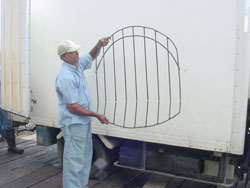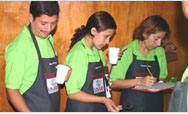You are here » Home » Telling Our Story
Success Story
Guyana benefits from U.S. training and certification
Shrimpers Help Keep Turtles Safe

| |
Photo: USAID/Wynette Oudkerk
|
|
A Guyanese fisherman in Georgetown displays a device that allows turtles to escape from shrimp trawling nets — U.S. law requires all shrimping nets to be equipped with this device.
"Government inspectors now check the trawlers to see that they are properly equipped with TEDs before they go out to sea. Once they are satisfied, a certificate is issued. The inspectors do a follow-up inspection when the trawlers return from sea, to ensure that the TEDs have been used," said Ivor Vandehar, a manager at a shrimping company.
|
In the 1980’s, the United States passed laws requiring all fresh-caught shrimp sold there to be caught on boats equipped with "turtle excluder devices" known as TEDs. The device helps prevent turtles from being trapped in shrimp nets. A metal grid with openings is attached to the trawling net. Larger animals, such as sea turtles, can easily escape, while the shrimp remain caught.
In March 2005, officials from the U.S. National Marine Fisheries Service paid a visit to Guyana to make sure that local boats met the necessary standards. The initial inspection revealed shortcomings, and Guyana faced the prospect of not being able to export shrimp to the United States. This was frightening for local fishermen who depend heavily on income from these exports, which total over $50 million annually. The shrimp exporters were given additional time to improve compliance with the "shrimp-turtle" law and a second inspection was scheduled for one month later.
As part of the country's efforts to meet the export standards, Guyana’s government turned to USAID for help in educating its inspectors and the Guyana Trawlers Association about how to comply with the law. Over the next month, shrimp boat operators and inspectors were trained in installing and inspecting the devices. As a result, government inspectors are now fully knowledgeable about the regulations and have been carrying out regular inspections before issuing certifications.
Ivor Vandehar, a manager at a shrimping company, attested to the program’s success. "Government inspectors now check the trawlers to see that they are properly equipped with TEDs before they go out to sea," he said. "Once they are satisfied, a certificate is issued. The inspectors do a follow-up inspection when the trawlers return from sea to ensure that the TEDs have been used."
Thanks to a timely intervention by USAID, Guyana exceeded the certification requirements and was recertified to export shrimp to the US.
Print-friendly version of this page (370kb - PDF)
Click here for high-res photo
Back to Top ^ | 

